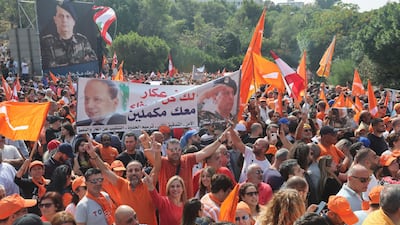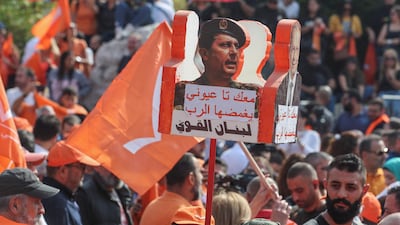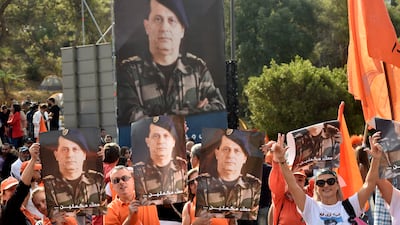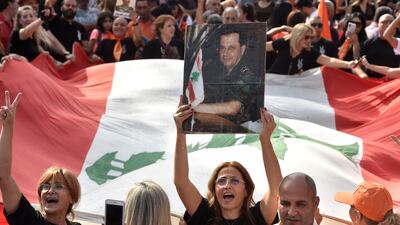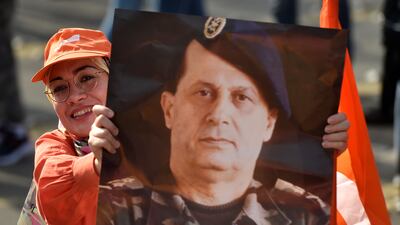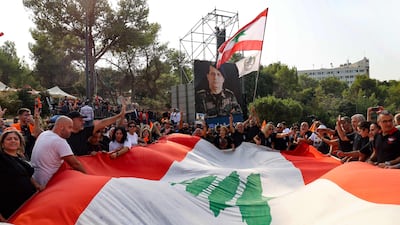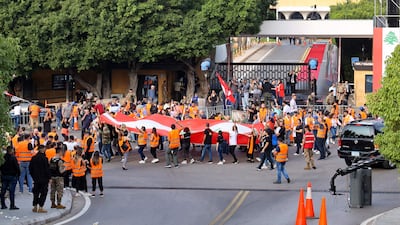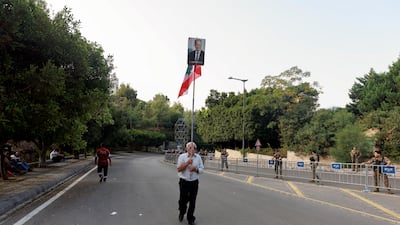Lebanon was officially in another power vacuum on Sunday as Michel Aoun left the presidential palace but with parliament yet to decide on his successor.
The divisive 89-year-old leader signed a decree accepting the resignation of the government a day before the end of his term.
“This morning, I sent a letter to the House of Representatives in accordance with my constitutional powers and signed the government's resignation decree,” he wrote on Twitter.
His departure comes despite no agreement on his replacement, after MPs failed to elect a successor in four attempts in Lebanon's deeply divided parliament.
Lebanon is being run by a caretaker government as political divisions have prevented the creation of a new Cabinet since parliamentary elections this year.
In the event of a presidential vacuum, the government is supposed to take on presidential powers. But it will be the first time a caretaker government could be called upon to fill the vacuum since the end of Lebanon's civil war 32 years ago.
Lebanon has been in the grip of an economic crisis that has been described by the World Bank as one of the worst in modern history. There is spiralling national debt, a banking crisis and the impact of the coronavirus pandemic. All of these challenges have combined during political upheaval and nationwide protests.
The failure to find a successor to Mr Aoun was not unexpected and has precedent — it took 46 sessions and 29 months for parliament to elect him in 2016.
In the country's confessional system, the presidency is always reserved for a Maronite Christian.
A few thousand supports gathered outside the presidential palace in Baabda to send off the former army chief who founded the Free Patriotic Movement, the political party which is allied with Iran-backed Hezbollah.
His departure came as Lebanon's most senior Maronite Christian cleric on Sunday accused authorities of creating a political vacuum by leaving the presidency unfilled.
Mr Aoun's term officially ends on Monday.
Patriarch Beshara Al Rai said they had “left this supreme and essential presidency in a vacuum, either deliberately, or out of stupidity or selfishness”.
Political blame game
In a speech outside the palace, Mr Aoun told thousands of supporters that he has accepted the resignation of Mr Mikati's government.
Addressing crowds of supporters, Mr Aoun blasted his political opponents and said that they prevented him from bringing to justice central bank governor Riad Salameh, who is being investigated in several European countries for alleged money laundering and embezzlement.
"You all know the the conditions of the country and how its coffers were robbed, its central bank was robbed and how your pockets were robbed," Mr Aoun said, adding that all Lebanese were hurt by losing their life savings in local banks.
He added that some politicians prevented the investigation into the port blast.
Mr Aoun, who blamed his political rivals and others for the crisis except for members of his political party, later left the palace and headed to his residence in Beirut's northern suburb of Rabieh.
Lebanese are deeply divided over Mr Aoun, a former army commander, with some seeing him as a defender of the country's Christian community and a leading figure who tried to seriously fight corruption in Lebanon.
His opponents criticise him for his role in the 1975-90 civil war and for his shifting alliances, especially with the Iran-backed Hezbollah, the country's most powerful military and political force.
He has also come under fire for grooming his son-in-law to replace him, and many blame him for the economic crisis that is rooted in decades of corruption and mismanagement.
Mr Aoun told parliament in a letter that Mr Mikati was "uninterested" in forming a new government to deal with Lebanon's myriad problems and called on him to resign.
Mr Mikati retorted that Mr Aoun's decision had "no constitutional basis" and that his cabinet will "continue to carry out all its constitutional duties, including its caretaker functions".
Constitutional expert Wissam Lahham said that "what Aoun is doing is unprecedented" since Lebanon adopted its constitution in 1926.
Economic crisis continues
Mr Aoun leaves Lebanon facing an array of challenges, from collapsing services to rampant inflation.
Talks between Lebanon’s government and the IMF that began in May 2020 and reached a staff-level agreement in April have made very little progress.
The Lebanese government has implemented few of the IMF’s demands from the agreement, which are mandatory before finalising a bailout program. Among them are restructuring Lebanon’s ailing financial sector, implementing fiscal reforms, restructuring external public debt and putting in place strong anti-corruption and anti-money laundering measures.
“The prospects of an IMF deal were already dim before the upcoming power vacuum and departure of Aoun,” said Nasser Saidi, an economist and former Minister of Economy. “There is no political will or appetite for undertaking reforms.”
“Aoun’s departure is simply another nail in the coffin,” he said. “It does not change the fundamentals of a dysfunctional failed state and totally ineffective polity.”


